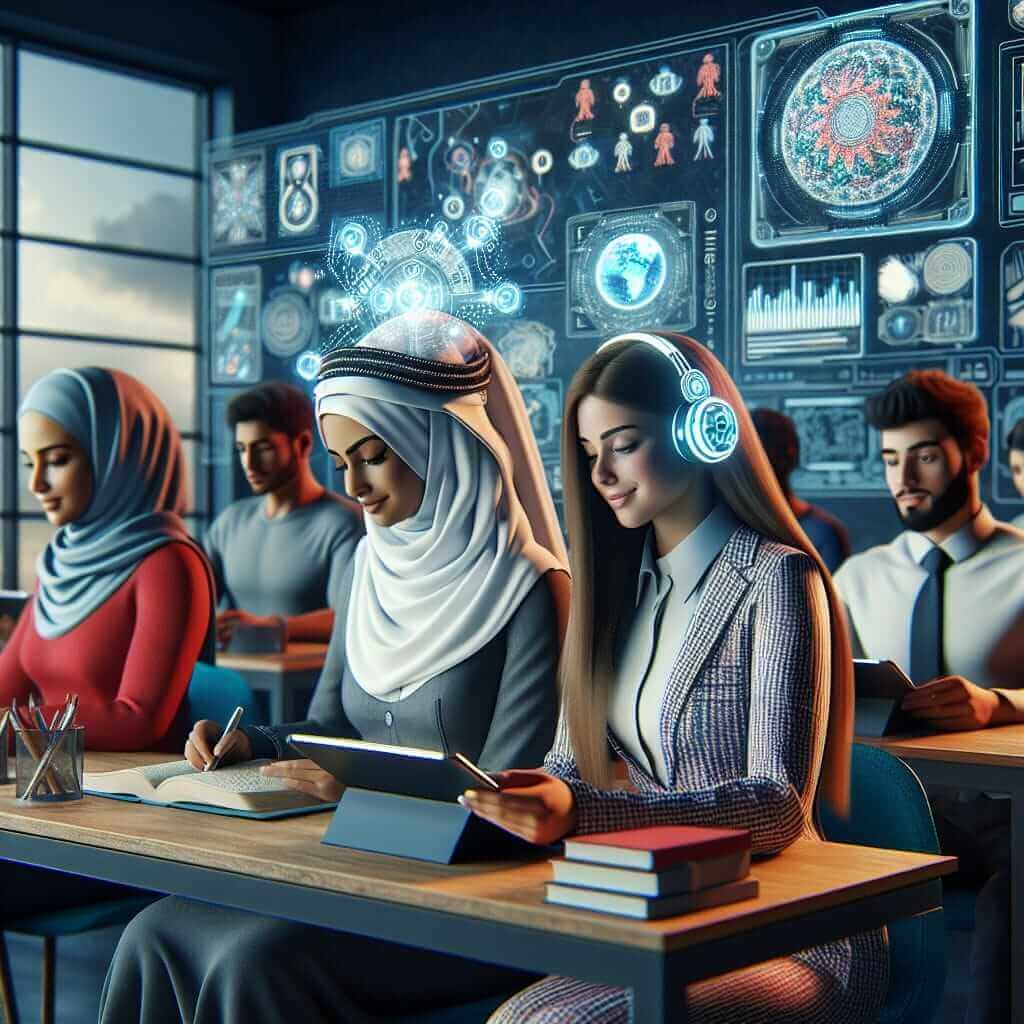When preparing for the IELTS Reading section, understanding common themes is crucial. One recurrent topic is the integration and social implications of artificial intelligence (AI) in various fields, including education. This subject aligns with contemporary discourse, making it a likely candidate for IELTS reading passages. The dynamic nature of AI and its social impacts has been widely discussed in both academic and public spheres. Knowing this, students should be prepared for reading passages that explore this modern issue.
Reading Passage and Questions
Reading Passage: Medium Text
Artificial Intelligence (AI) has been heralded as a transformative force in education. This innovation has the potential to revolutionize how we learn and teach, yet its social implications are multifaceted and complex.
AI in education can personalize learning experiences. By analyzing data on individual student performance, AI systems can tailor educational content to meet each learner’s needs. This can address diverse learning styles and paces, providing custom feedback and support. Some argue that AI can democratize education, making high-quality resources accessible to a broader audience including those in remote areas.

However, AI’s integration into education systems raises concerns about data privacy and security. The extensive data collection required for personalized learning can be vulnerable to breaches. Additionally, the algorithms behind AI systems can exhibit biases, potentially reinforcing educational inequalities.
Another significant social implication is the potential impact on employment within the educational sector. While AI can handle administrative tasks, grade assignments, and even tutor students, this automation could result in job displacement for teachers and administrative staff. Conversely, it could also lead to new roles focused on developing and managing AI systems.
Furthermore, the overreliance on AI in education might impact the teacher-student relationship. The value of human interaction in education cannot be understated. Effective teaching involves empathy, encouragement, and complex problem-solving, aspects that are challenging for AI to replicate fully.
In conclusion, while AI promises numerous benefits for education, its social implications must be carefully considered. Stakeholders must navigate these challenges conscientiously to harness AI’s potential while mitigating its risks.
Questions
Multiple Choice
-
What is one of the primary advantages of AI in education as mentioned in the passage?
A. Cost reduction in educational materials
B. Personalizing learning experiences
C. Increasing teacher salaries
D. None of the above -
How can AI democratize education according to the passage?
A. By providing lessons in multiple languages
B. By increasing the role of teachers
C. By making high-quality resources accessible to all
D. By reducing the length of the school day
True/False/Not Given
-
The passage claims that AI can eliminate all biases in educational content.
- True
- False
- Not Given
-
AI has the potential to replace all administrative positions within educational institutions.
- True
- False
- Not Given
Matching Information
-
Match each potential implication of AI in education with its description:
- A. Data Privacy Concerns
- B. Job Displacement
- C. Teacher-Student Relationship
i. Breaches due to extensive data collection.
ii. AI handling administrative tasks.
iii. Human interaction cannot be fully replicated by AI.
Summary Completion
- Complete the summary using no more than two words from the passage:
AI has the capability to __ learning experiences and potentially make educational resources more __. However, issues such as data privacy, biases, job displacement, and the impact on __ relationships need careful evaluation.
Answer Key and Explanations
- B (Personalizing learning experiences) – The passage highlights how AI can tailor educational content to individual needs.
- C (By making high-quality resources accessible to all) – AI can broaden access to quality education, especially in remote areas.
- False – The passage states that algorithms can exhibit biases, not that they can eliminate them.
- Not Given – The passage mentions job displacement but does not claim AI will replace all administrative positions.
- A-i, B-ii, C-iii – The passage details data privacy concerns with i, job displacement with ii, and teacher-student relationship with iii.
- personalize, accessible, teacher-student – The text discusses AI’s personalization of learning, accessibility of resources, and the importance of teacher-student relationships.
Common Mistakes and Tips
Common Mistakes
- Misinterpreting the Passage – Ensure you understand the passage fully before answering.
- Ignoring Context – Pay attention to the context in which statements are made, especially for True/False/Not Given and Matching Information questions.
- Overlooking Key Details – Don’t skim over essential details that could change the meaning of the answer.
Tips
- Practice with Variety – Engage with various topics and question types to be better prepared.
- Build Vocabulary – Expand your vocabulary to better comprehend and analyze complex passages.
- Stay Updated – Being aware of current events and technological advances like AI can provide contextual understanding.
Vocabulary and Grammar
Vocabulary
- Heralded (v): /ˈherəldɪd/ – announced or proclaimed.
- Multifaceted (adj): /ˌmʌltiˈfæsɪtɪd/ – having many aspects.
- Empathy (n): /ˈɛmpəθi/ – the ability to understand and share the feelings of another.
Grammar
- Complex Sentences: The passage uses complex sentences to convey sophisticated ideas, e.g., “While AI can handle administrative tasks, grade assignments, and even tutor students, this automation could result in job displacement for teachers and administrative staff.”
Advice for Scoring High in Reading
- Read Actively – Engage with the passage by underlining key points.
- Practice Regularly – Consistent practice with various texts improves speed and comprehension.
- Understand Question Types – Familiarize yourself with different question formats and strategies to tackle them.
For further reading on related topics, consider checking our articles on Social Impacts of Artificial Intelligence, Social Implications of Technological Unemployment, and Social Implications of Artificial Intelligence on Human Relationships.